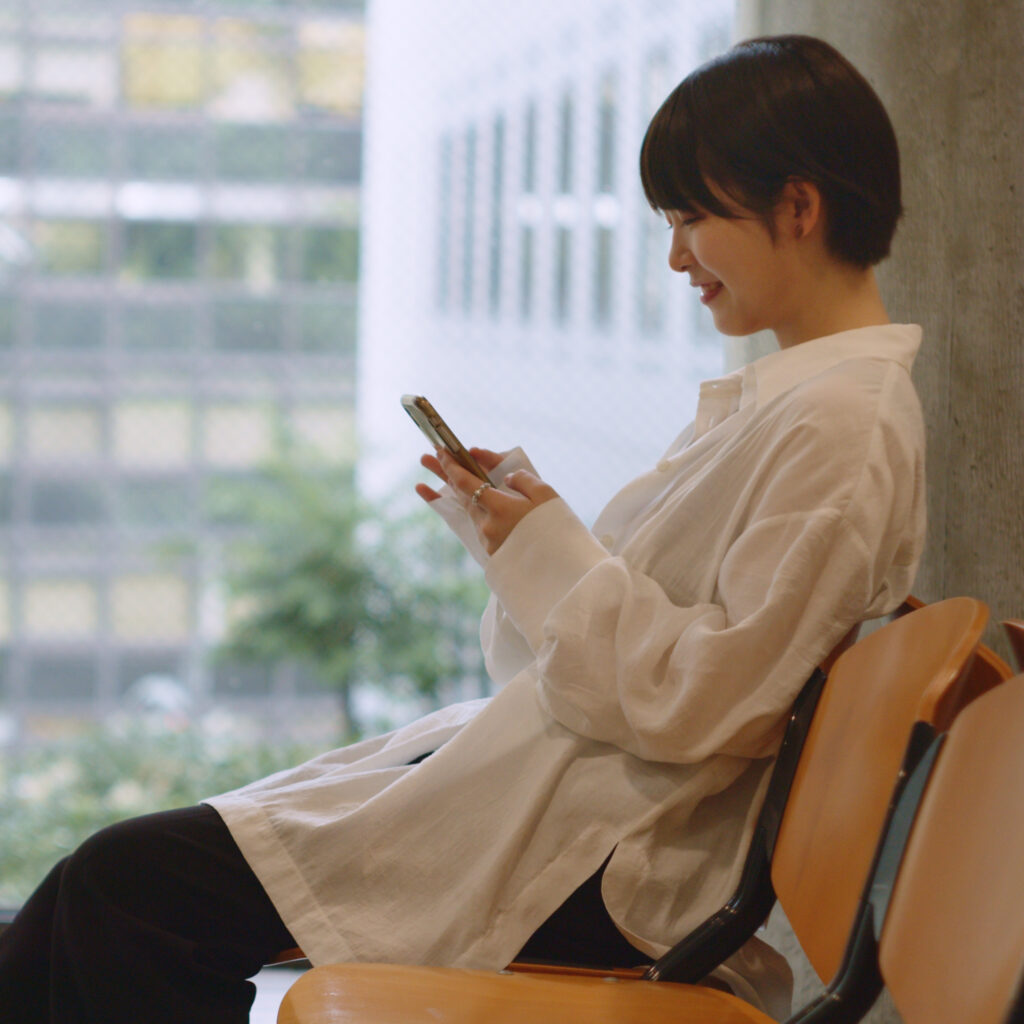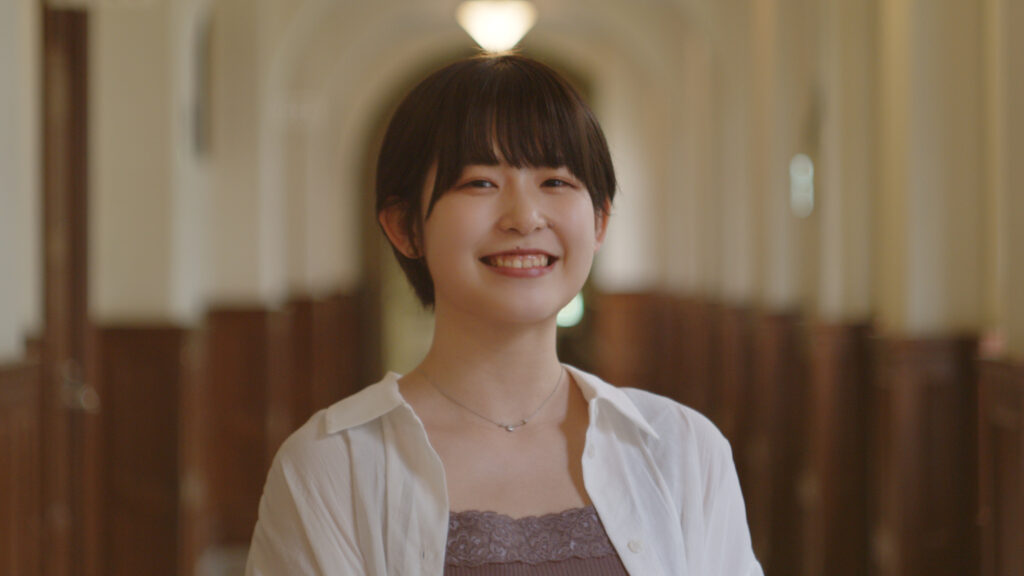Life is full of small moments of realization that help shape our futures

Nozomi Ikeda, a fourth-year student at the Faculty of Global Studies says, “I’m now more conscious than ever about understanding the viewpoint of others before expressing my own opinions.” The insights she has gained through her classes and experiences with non-profit organizations has changed the way she views the world and the people who live in it.
Discovering the differences that connect people across borders
Before beginning my studies at university, I faced a dilemma. I knew that I wanted to study global issues and tackle problems that exist on an international scale, but as someone without any firsthand overseas experience, I wasn’t sure what area of study I should specialize in. While considering my options, I saw a news story covering the difficulty of life as a refugee and became inspired to help in whatever way I could.
Sophia University had many undergraduate departments that cover global issues, so there were many options for me to choose from, but I ultimately decided on joining the Faculty of Global Studies, as students can designate which specialized field they want to join after their first year of general study covering civil society, global relations, and international cooperation.
When I began my studies, I was a little bit naïve, and had built up the word “global” to have a sort of special meaning. To me, if something was considered global, that meant it was cool and implied that the world was becoming one – ideas that only held positive connotations in my mind.
However, through my undergraduate studies, I came to realize that true globalization is not about lumping everyone together into the same box, but rather about recognizing and celebrating the individuality and diversity of others. While the concept of the world becoming one is often viewed in an optimistic way, there are often unintended consequences like the loss of culture and language, and I discovered that globalization is a more complex subject than I had originally thought.
Additionally, I found that I hadn’t realized that there was a difference between the terms “international” and “global” until I began my studies. International refers to the connections that transcend national boundaries, but may only affect a select number of countries. Conversely, global refers to concepts and issues that affect everyone on the planet, regardless of international borders.
Before I came to this realization, I had been viewing the world in a more compartmentalized manner, and hadn’t understood that there are global issues that are bigger than any one country. This new discovery made me realize that beliefs I have held onto for my whole life may not be the only way to view situations, and helped me to open my mind to new concepts and ideas.
Recognizing Social Injustices at Home and Abroad

One of the stand out memories from my time at Sophia University was when I was able to work abroad for a student organization that provides educational support for children in India and the Philippines. When I joined the organization, I assumed that the support would flow in only one direction and that all the teaching would come from our side, but this was not true at all. In the personal connections I made with the locals I was supporting, I came to realize that we, the supporters, received just as much as we gave, and I learned a lot about myself. My partners and I would spend hours discussing what education support really means, and I found myself asking “what can I do to make a difference” on a daily basis.
Locally, I also had the opportunity to meet directly with foreign workers and immigrants coming to Japan through my activities at a nonprofit organization that works on immigration issues. It was painful to think about the freedom I had to travel abroad without persecution, and how these people were not granted the same liberties as I. By putting myself in their shoes and imagining how I would feel if I were faced with the same restrictions, I understood for the first time that what I considered normal freedoms in my life are not the same for everyone in the world. Before I had this experience, I always assumed that immigration and refugee issues were only problems for other countries, and that they didn’t exist in Japan. I thought that if I wanted to work directly with refugees, I would have had to travel abroad to another country, but I now understand that there are actually many global issues that can be tackled right from Japan.
By working directly with refugees and seeing their personal struggles firsthand, I learned that I should not impose my own assumptions onto others. Just because something is right for me, does not mean that it’s right for someone else. I’m now more conscious than ever about thinking from other people’s points of view before expressing my own opinions.
Helping Others by Solving Problems at the Source
Sophia University fosters an environment that allows students to be independent and take action for themselves. When I wanted to deepen my understanding of immigration issues, I consulted a professor who specializes in that field, and he recommended that working for a nonprofit organization would be a great way for me to achieve my goals.
Sophia’s campus is located in the heart of Tokyo, which is conveniently accessible from many places. It was reassuring to know that I could drop by the university and discuss my questions and problems with my teachers before going to participate in my off-campus activities, without having to venture too far from my destination.
Alongside the helpful professors, I was also able to study with many other hard working students. We’re all working towards our own personal goals, and seeing my peers make steady progress is something that inspires me and makes me want to achieve my own goals, too. It never feels like I’m alone in my pursuits, which is a reassuring feeling. And since Sophia is a Catholic University, I was able to experience the spirit of Christianity and other religious views from our priests, which has been another great source of support for me to rely on.
With my final year of study nearing completion, I have decided that I would like to work for a general trading company. While the activities I took part in at nonprofit organizations and student groups certainly gave me valuable experience emphasizing and fighting for the rights of the less fortunate, I realized that the best way for me to be a part of the solution to these unique problems was to implement change through economic endeavors.
In working for a general trading company, I hope to be involved in infrastructure development and improvement in India. I want to improve the lives of the local people whom I helped through my student organization. If I had entered the job market without an education in international cooperation or non-governmental organizations, I’m not sure if I would have had the insight to consider the benefit of others in my career path planning. While a general trading company will always place emphasis on generating revenue, I plan to use my experiences at Sophia to always approach situations with an empathetic mindset and make positive contributions in whatever way I can.
※Please note that the content of this article is current as of September 2021